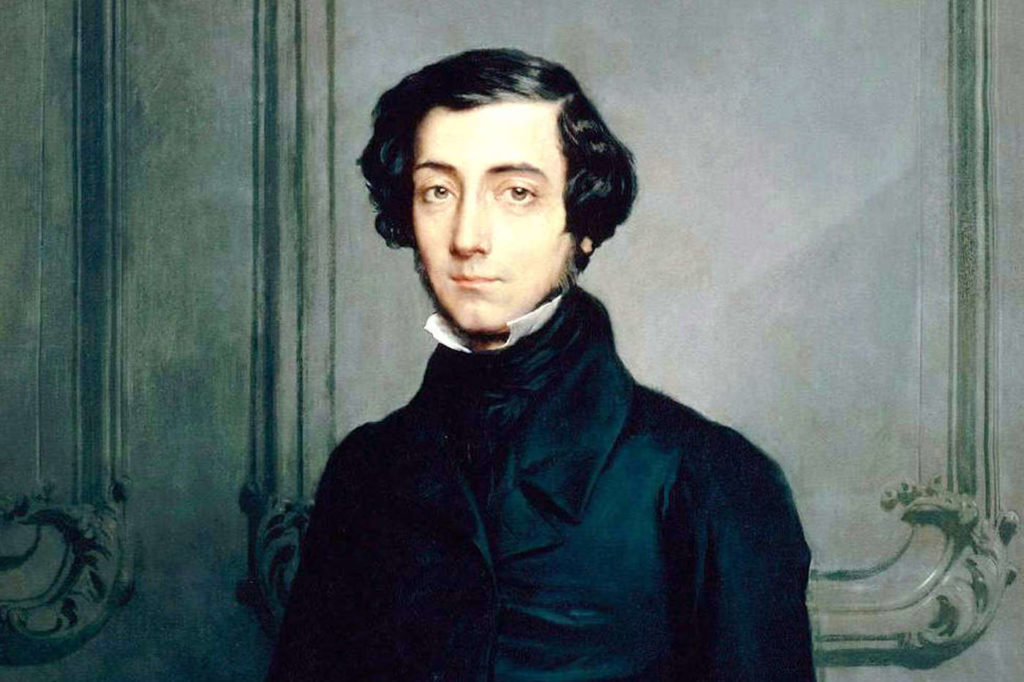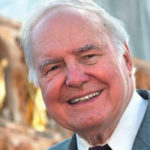Reports of the death of American exceptionalism abound, and they are not greatly exaggerated. If its demise is not complete, no doubt its condition is inauspicious. A multicultural age, which inherently has no center, is adverse to such culturally-centric conceits.
What many today fail to appreciate is that American exceptionalism is not synonymous with American superiority. Indeed, a case could be made that there has been an inverse relationship between the two, in that America’s exceptionalism has become more tenuous the more powerful America has become. What further and more forcefully undercuts the conflation of exceptionalism and superiority is that American exceptionalism is rooted in America’s founding—that is, in a time when a fledgling and fragile America was eclipsed by more prominent civilizations, past and present.
Perhaps no one affords a greater understanding of American exceptionalism—what it is and what it is not—than Alexis de Tocqueville. French and aristocratic by birth, Tocqueville was tendentiously devoted neither to America in particular nor to democracy in general. He was also possessed of an astonishing acuity and keen sensitivity, which not only permitted him to apprehend America’s many shortcomings (its mistreatment of African and Native Americans foremost among them), but compelled him to draw attention to them. That such a man still found in America something exceptional demonstrates that a belief in American exceptionalism need not stem from narrow-minded chauvinism.
What did that French aristocrat find so exceptional in America’s nascent democracy? A great deal, but perhaps most fundamentally and most consequentially, the habits to sustain it.
Start your day with Public Discourse
Sign up and get our daily essays sent straight to your inbox.This may seem decidedly unexceptional in an age when democracy is sustained in many places beyond America. But what concerned Tocqueville was not so much the form of democracy, but the practice of it—the ability of a people to govern itself. That sort of ability did not come naturally. Or if it did, it was so intrinsically precarious and susceptible to inimical influences—both internally and externally—that it was no less natural for it to be eradicated. Tocqueville was fascinated by the township governments of New England, which had no parallel on his native continent. In these townships, the people actively and concertedly directed their own affairs, got on without the aid of an overarching state, and exercised their freedom responsibly and prudently, fully aware that freedom carries with it tremendous burdens.
Those township governments in particular, and America’s federalist system in general, served to preserve what Tocqueville considered a sacred good—not democracy, but liberty. Tocqueville supported democracy not so much because he thought it admirable, but because he thought it inevitable. He occupied a unique historical moment that was bounded by a moribund aristocratic age and a dawning democratic one. Unlike many of the reactionaries of his day, he saw there was no going back. But he also discerned a danger in democracy that many of its ardent supporters failed—and to this day still fail—to see.
Democracy, for Tocqueville, was not reducible to a form of government. Rather, it signified a social state that was centuries if not millennia in the making and had no analogue in the annals of history. What preceded the democratic age was an aristocratic order where there existed, in a sense, “two distinct humanities”: the nobility and everyone else. To illustrate the chasm that separated the two, Tocqueville cites an anecdote regarding “Mme. du Châtelet, who according to Voltaire’s secretary, felt no embarrassment at undressing in front of her servants, not considering it really proven that valets are men.” That age, when it was not clear to which species valets belonged, is no more. Contemporary movements fighting the many inequalities that still persist today actually do more to substantiate Tocqueville’s point than controvert it. As he observed, “when inequality is the common law of a society, the strongest inequalities do not strike the eye; when everything is nearly on a level, the least of them wound it. That is why the desire for equality always becomes more insatiable as equality is greater.”
And therein lies the great danger of the democratic age: the unquenchable longing for equality will exceed all others, to such an extent that the denizens of that age will prefer “equality in servitude to inequality in freedom.”
Tocqueville did not deny that people in the democratic age valued freedom. Indeed, he thought they had an instinctive taste for it. But it “is not the principal and continuous object of their desire.” Again, that object is equality. Because it is the opinions, prejudices, interests, and passions of the people that direct society in democratic ages, ultimately the people will secure what they desire. That is why, contrary to popular belief, democracy and socialism are not antithetical but akin to one another. It is also why despotism, so congenital to socialism, is not inconsistent with democracy. To be free and unequal or equal and unfree—for democratic man, that is the question.
Of the two, Tocqueville was of the view that the former was not only more worthy, but more natural. “Intellectual inequality,” he wrote, “comes directly from God.” But of course, it is not just human intelligence that is distributed unequally. There is, to quote Madison, a “diversity in the faculties of men,” from which an unequal distribution of property naturally results. Because there is a necessary connection between freedom and inequality, and because equality is the principal and continuous object of democratic man’s desire, the people of democratic ages ultimately will elect to be unfree. They will choose to replace the inequality that nature had undemocratically bestowed upon them with an artificial equality that only the state can effect. Hence the dread of despotism that darkened Tocqueville’s horizons.
One might be inclined to regard this development as something to be exalted, not lamented, insofar as an inequality that was arbitrarily imposed on man is replaced with an equality freely chosen by him. Heretofore the plaything of nature, man at last gains control of his own destiny! But the choice to be equal in servitude is made instinctively, not freely. It is not the product of an autonomous will, but of a servile one, in that those who make it are slaves to, not masters of, their appetites. Democratic peoples reflexively follow their natural inclinations until they find themselves sitting beneath “an immense tutelary power” that solicitously manages and micromanages more and more of their lives. In doing so, it “renders the employment of free will less useful and more rare, and little by little steals the very use of free will from each citizen.” This state—at once absolute and paternalistic, despotic and mild—will prove much easier to erect than escape.
Tocqueville often was uncannily prophetic, but his revelations are not divine. His were the musings of a young French aristocrat who toured the United States in search of an image of democracy itself. He sought to divine the future of democracy and, with it, the fate of mankind. In his view, the leveling of man was inescapable. What remained to be seen was what would become of humanity. Would equality lead to “freedom or servitude, to enlightenment or barbarism, to prosperity or misery?” To illumine the paths that lay ahead so that man would not blunder blindly to his ruin—that was Tocqueville’s mission.
The prodigious growth of the federal government, which counted 12,000 civil servants in Tocqueville’s day and more than 2,000,000 today, ought to lend a good deal of weight to his forewarnings. Had America’s population witnessed a commensurate increase, it would stand at over two billion today.
In the eyes of many, this growth is viewed favorably. A state that provides more to, does more for, and cares more about its people is the very embodiment of progress. And there are compelling arguments to be made in support of that view. On questions pertaining to the purpose and appropriate reach of the state, inquiring minds can disagree. But the problem today is that minds—to bring this back to the question of American exceptionalism—have ceased to inquire. The students who enter my classroom semester in and semester out are bereft of the mere idea of American exceptionalism, not because the concept is incorrect, but because it is politically so. To insist that what is incorrect politically is ipso facto incorrect is, well, not correct.
In Tocqueville’s eyes, the state’s aggrandizement portends despotism, not progress. As he saw it, “there is nothing more prolific in marvels than the art of being free; but there is nothing harder than the apprenticeship of freedom.” Supposing Tocqueville to be correct on this score, as he was on so many others, how unfortunate to have undergone that apprenticeship and mastered the art of being free, only to permit that art to lapse into obsolescence or worse yet, oblige it to do so.
Early on in Democracy in America, Tocqueville contrasts “a manly and legitimate passion for equality” with the “depraved taste for” it. The former “spurs all men to wish to be strong and esteemed” while the latter “impels the weak to want to bring the strong down to their level.” Perhaps it would be going too far to suggest that the latter taste explains the consignment of American exceptionalism to oblivion. Still, it is reasonable to conclude that the pervasive neglect of that idea is not altogether benign.














